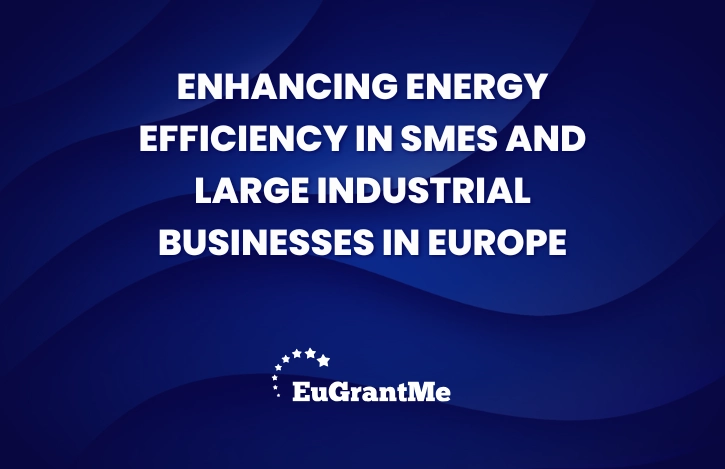Improving energy efficiency in businesses is crucial for reducing costs, lowering emissions, and increasing competitiveness. European policies and regulations push companies to adopt more sustainable practices. Small and medium-sized enterprises (SMEs) and large industrial businesses play a key role in meeting energy efficiency targets.
Energy use in industrial and commercial sectors represents a significant portion of Europe’s total consumption. Implementing efficient energy management strategies helps businesses lower operational costs and meet sustainability goals. This approach benefits the environment and strengthens long-term economic growth.
The Importance of Energy Efficiency
Energy efficiency improves business performance while reducing environmental impact. It helps companies lower their energy bills and meet strict regulatory requirements. With rising energy prices, optimising consumption is a necessity rather than a choice.
Efficient energy use also supports Europe’s climate goals. Reducing consumption decreases reliance on fossil fuels, contributing to emissions reduction targets. Businesses that adopt energy-saving measures gain a competitive advantage in the market.
Key Challenges in Energy Efficiency
Many businesses face challenges when trying to improve energy efficiency. High initial investment costs often discourage SMEs from upgrading equipment or adopting new technologies. Larger industries may struggle with complex production processes that require significant energy input.
Lack of awareness is another obstacle. Some businesses do not fully understand the long-term benefits of energy efficiency. Without clear financial incentives or regulatory pressures, many companies delay improvements.
Energy Audits and Monitoring Systems
Regular energy audits help businesses identify inefficiencies and opportunities for improvement. These audits provide insights into consumption patterns and highlight areas where savings can be made.
Advanced monitoring systems allow businesses to track energy use in real time. Smart meters and automated control systems help reduce waste by optimising operations. Accurate data supports better decision-making and cost reductions.
Energy-Efficient Equipment and Technologies
Investing in energy-efficient machinery significantly reduces consumption. Modern equipment operates with higher efficiency, lowering energy use without compromising performance. Upgrading lighting, heating, and cooling systems can also lead to substantial savings.
Renewable energy technologies help businesses reduce dependence on conventional energy sources. Solar panels, wind turbines, and biomass systems provide cleaner alternatives. Many European countries offer incentives for businesses that integrate renewables into their operations.
Process Optimisation and Waste Reduction
Optimising production processes improves energy efficiency without major investments. Adjusting workflow sequences, reducing idle times, and minimising resource waste lead to lower energy consumption. Simple measures, such as switching off unused equipment, contribute to overall efficiency.
Energy recovery systems capture waste heat from industrial processes and reuse it for other operations. This approach increases efficiency and lowers costs. Many industries benefit from heat exchangers and cogeneration systems that enhance overall energy use.
Employee Engagement and Training
Workforce awareness plays a vital role in energy efficiency. Employees who understand energy-saving practices contribute to reducing waste. Training programmes ensure staff follow best practices and make informed decisions.
Encouraging behavioural changes creates long-term improvements. Simple actions, such as turning off equipment when not in use, make a difference. Businesses that involve employees in energy-saving initiatives see higher efficiency gains.
Financial Incentives and Support Programmes
Several European funding programmes support businesses in adopting energy-efficient solutions. Grants, subsidies, and low-interest loans help reduce the financial burden of upgrading systems. Many governments offer tax incentives for investments in energy-saving technologies.
Businesses should explore available funding opportunities to improve energy efficiency. Collaborating with financial institutions and energy service companies facilitates access to capital. Support programmes help companies implement sustainable energy strategies without excessive financial strain.
Compliance with EU Regulations
European energy policies encourage businesses to improve efficiency. The EU Energy Efficiency Directive sets targets and obligations for companies to reduce consumption. Large industries must conduct regular audits and report their progress.
SMEs often benefit from less strict requirements but are still encouraged to adopt energy-saving measures. Compliance ensures businesses avoid penalties and take advantage of available incentives. Staying informed about regulatory changes helps companies remain competitive.
Digital Solutions for Energy Management
Digitalisation plays a key role in optimising energy use. Smart grids, automation systems, and artificial intelligence enhance monitoring and control. Predictive analytics help businesses anticipate energy needs and reduce unnecessary consumption.
Cloud-based energy management platforms allow businesses to centralise data and streamline decision-making. These solutions provide insights into patterns, enabling more efficient resource allocation. Digital tools improve transparency and accountability in energy consumption.
Sustainable Supply Chains and Green Procurement
Energy efficiency extends beyond direct operations. Businesses can improve sustainability by working with energy-efficient suppliers. Choosing materials and products with lower energy footprints reduces overall consumption.
Green procurement policies encourage businesses to prioritise sustainability. Selecting energy-efficient equipment, transportation, and logistics partners strengthens efficiency efforts. A well-structured supply chain minimises environmental impact while maintaining cost savings.
Future Trends in Energy Efficiency
Technological advancements continue to shape the future of energy efficiency. Innovations in battery storage, hydrogen production, and smart grids will further optimise energy use. Businesses that embrace emerging technologies stay ahead of regulatory and market trends.
Circular economy models integrate energy efficiency with waste reduction. Recycling materials, repurposing by-products, and adopting closed-loop systems improve resource use. Sustainable practices ensure long-term resilience in an evolving energy landscape.
Strengthening Business Competitiveness
Energy efficiency in businesses is not just an environmental responsibility. It is a strategic advantage that improves financial performance and ensures sustainability. Companies that invest in efficiency strengthen their market position and build resilience against energy price fluctuations.
By adopting new technologies, engaging employees, and leveraging financial incentives, businesses can achieve significant efficiency gains. Enhancing energy efficiency in businesses benefits the economy, the environment, and future generations.
At EuGrantMe, we are passionate about fostering innovation and empowering ambitious minds to flourish. Our mission revolves around providing top-notch grant writing services for the EIC Accelerator and Horizon grants in Europe. We enable our customers to unlock the full potential of their ground-breaking ideas.
Do you have a project to turn into reality?
Contact us!


